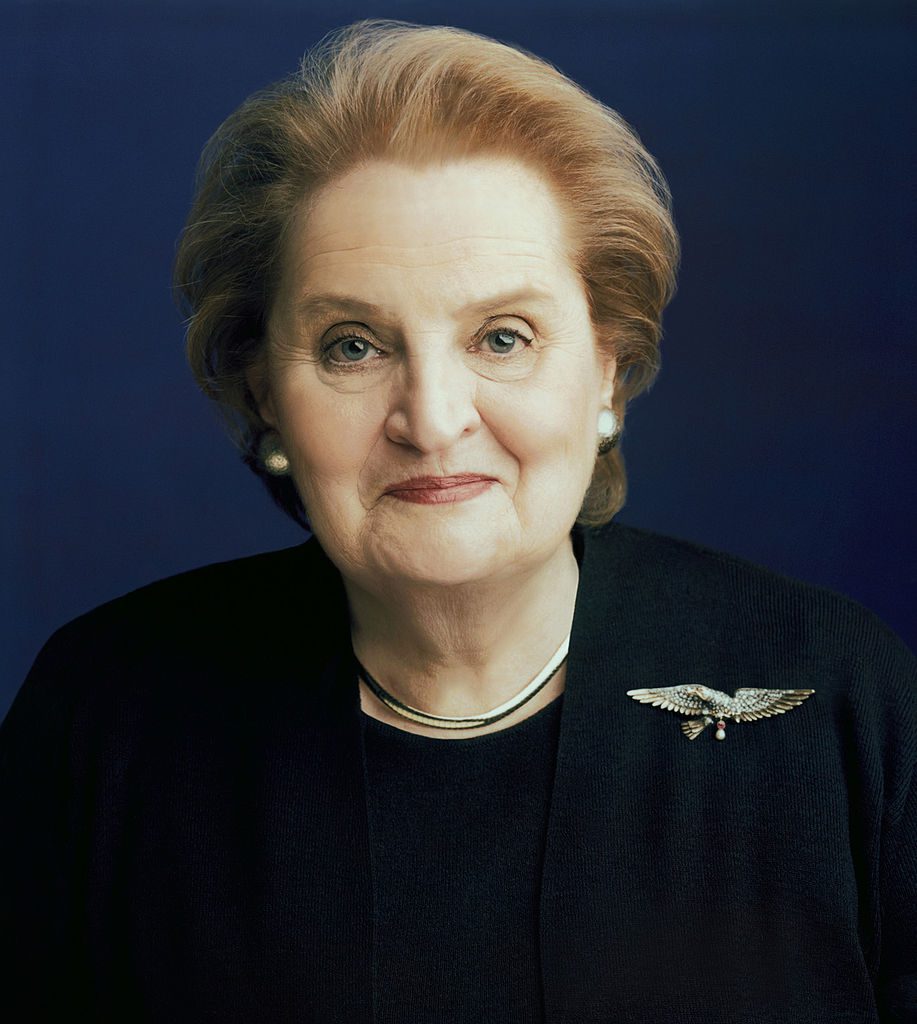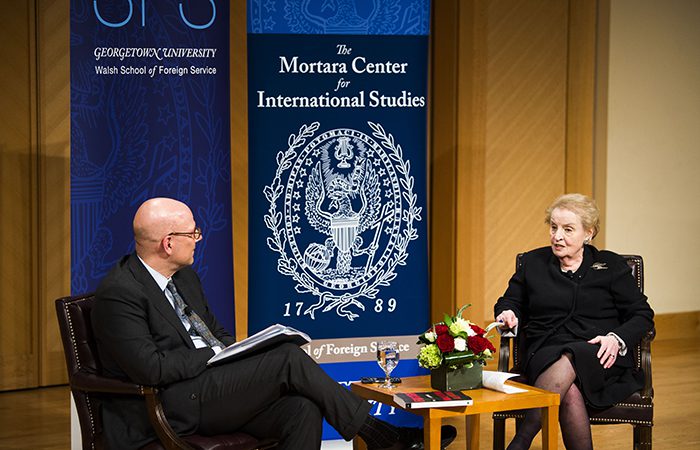Georgetown Mourns, Memorializes Madeleine Albright (1937-2022)
By • March 24, 2022 0 1321

The death from cancer on March 23 of Madeleine K. Albright (1937-2022) – the first woman U.S. Secretary of State – marks a time now for celebrating the life of a remarkable world figure. She was a tough talking, brooch-wearing, often times hawkish but also charming woman whose policies made history especially in Eastern Europe and by strengthening NATO.
Her passing also marks a time when many Georgetowners will be sharing stories and mourning the loss of Albright — a highly engaged, visible and inspiring Georgetown resident.
Albright lived on 34th Street since 1968, as told in The Georgetowner’s exclusive interview by Amos Gelb with her, May 20, 2020, https://georgetowner.com/articles/2020/05/20/my-georgetown-madeleine-albright/. She raised her three daughters there as a highly popular professor at Georgetown University in between public service as a UN Ambassador and foreign affairs official.
Her home became a sort of modern-day salon with numerous foreign policy officials, ambassadors and academics eating from plates on their laps as they discussed the greatest issues of the day. In addition to English, Russian, and Czech, Albright also spoke French, German, Polish, and Serbo-Croation with some understanding of spoken Slovak, according to a 2008 interview she gave to Conde Nast.
Georgetown University colleagues, students, neighbors, even shoppers and tourists by the hundreds have personal stories of Albright’s personal warmth, friendliness and willingness to share her lessons learned from a dramatic life starting as a refugee from communist-run Czechoslovakia. But the memories and stories Georgetowners have and may share during the coming weeks are those of Albright as a neighbor and engaged resident.

Georgetown’s Walsh School of Foreign Service dean, Joel Hellman interviews Madeleine Albright about her latest book. Photo courtesy Georgetown University.
The focal point for many may be her frequent visits to Martin’s Tavern at the corner of Wisconsin Avenue and N St NW. “She came here for over 20 years and was just the most gracious person, down to earth and wonderful — even through the heat of what she had to deal with for so many years,” said Billy Martin, the fourth-generation owner of the tavern. “The fact that she just stayed so calm, was remarkable.”
“One evening in the midst of a foreign affairs crisis, she called me over to the table and told me how reassuring it was to be able to come to Martin’s and have their comfort food,” Martin said. Her favorites were the shepherd’s pie and the tavern’s version of the “Hot Brown” — a grilled turkey, cheese, tomato and spices, Martin added. About eight years ago, the tavern named a booth in her honor with a plaque; the Martin’s Hot Brown also may be renamed in her honor. For now, the table is left open with flowers and a sign; a memorial event is being planned.
Gail Scott, a journalist and resident of Georgetown for over 37 years, was a neighbor of Albright’s for over a decade. While their backyards adjoined, they did not have an over-the-backyard-fence relationship, Scott told The Georgetowner, but there were many encounters over the years. One evening when her husband was walking their dog, Albright was having a buffet dinner. The door was open. Smelling the food, the beagle got away and ran into the house. “Fred heard noises of people scattering, and indications that Albright’s Secret Service team were trying to get the dog,” Scott said. “Finally, the secretary of state came to the door and asked Fred to please come in and retrieve the dog. She said something to the effect that ‘my Secret Service team can’t seem to get a hold of him.’ Albright was calm and polite to Fred, a bit more annoyed with the inability of the security team to secure the dog, who walked out calmly when Fred saw him.”
Albright constantly made herself available to public affairs groups to discuss foreign policy. In 2008, as Vice President of the Woman’s National Democratic Club at Dupont Circle, this reporter sat next to Albright during lunch before her hour long talk to the club. She spoke with admiration of her father Josef Korbel, who had had to remake his academic life twice, first upon leaving his homeland in 1938 for England, and then with the family’s immigration to the U.S. where he became a professor of international relations at the University of Denver.
“One of his favorite mentees was a young African-American woman from Georgia, Condoleezza Rice,” Albright said. “Rice was often at the house, treated as family and has often said that Korgel inspired her to specialize in Russia and Eastern European politics.” Years later in 1997 when President Clinton named Albright to be his Secretary of State, the first person she thought of to be her Assistant Secretary for Eastern European affairs was Rice, Albright said. “Rice was flattered but said she didn’t think she could since she was a Republican” — a fact Albright told me with a laugh that she didn’t know or even think of.
Albright wrote seven books. Her final two are most timely. In January 2019, her book, “Fascism,” was described as a personal and urgent examination of fascism in the 20th century and how its legacy shapes today’s world. Her last, “Hell and Other Destinations” is aptly subtitled “A 21st Century Memoir.”

The Madeleine Albright booth at Martin’s Tavern in Georgetown. Courtesy Billy Martin.

